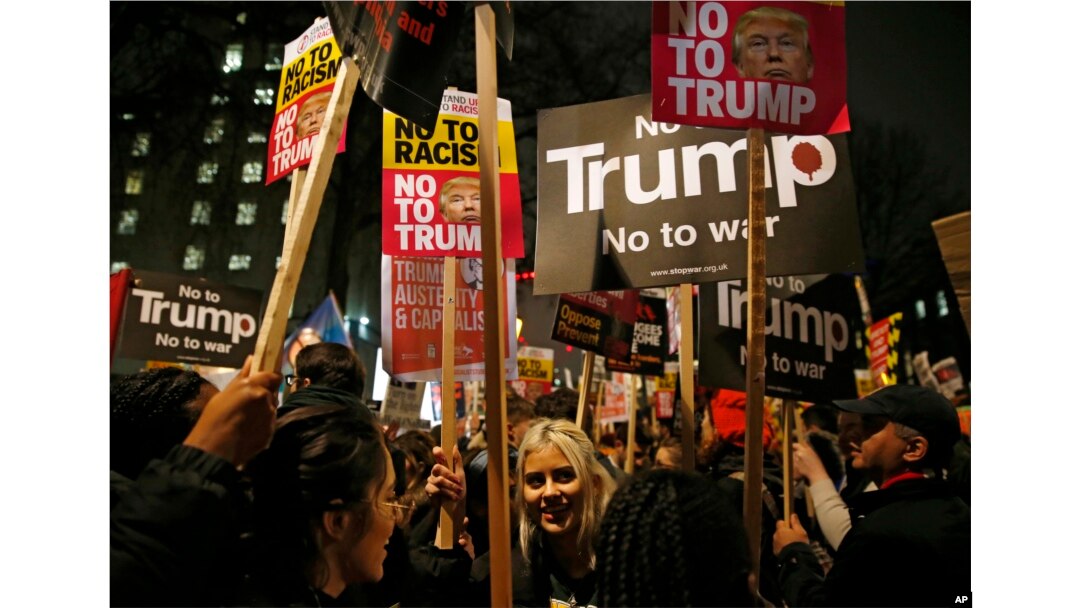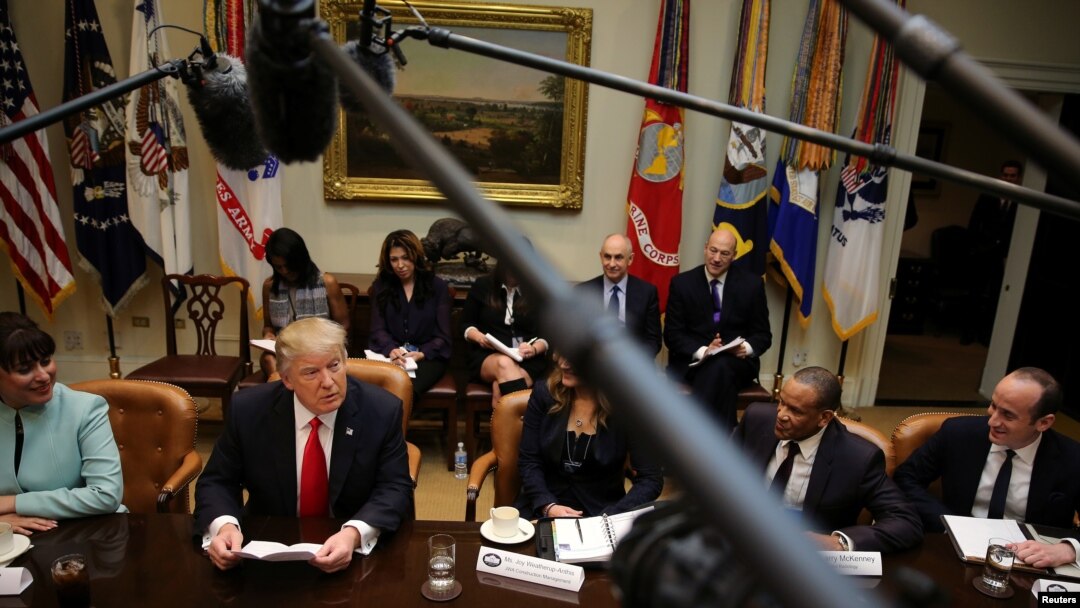During last year's presidential campaign, Donald Trump's supporters were thrilled with the idea that he would become Washington's "disrupter-in-chief." Less than two weeks into his presidency, no one could dispute that Trump is doing all he can to follow through on that pledge.
Since his inauguration January 20, Trump has moved quickly to deliver on his agenda of change. He has signed several executive orders aimed at jump-starting key parts of his domestic policy priorities, but his highly controversial move to tighten immigration and his insistence on investigating voter fraud in the November 2016 election have become major distractions in the early days of his presidency.
Immigration furor
Trump's order banning entry to refugees and immigrants from seven Muslim-majority countries has sparked a firestorm around the country and internationally. There have been protests at U.S. airports and in several cities blasting the new policy as unfair to immigrants.

Demonstrators hold banners as they take part in a protest against U.S President Donald Trump's controversial travel ban on refugees and people from seven mainly-Muslim countries, outside Downing Street in London, Jan. 30, 2017.
Trump has fired back on Twitter. "There is nothing nice about searching for terrorists before they can enter the country," Trump said in one tweet early Monday. In another, he added there "are a lot of bad 'dudes' out there."
At the White House on Monday, Trump defended his decision.
"We actually had a very good day yesterday in terms of homeland security. We had to make the move and we decided to make the move," he said.
Your browser doesn’t support HTML5
Trump Brings a Whirlwind of Change in First Days
Vocal opposition
Democrats were quick to express opposition and, in some cases, outrage with the Trump order on immigration.
Senate Democratic leader Chuck Schumer told a news conference Sunday in New York that the measure was "mean-spirited," and added, "it was implemented in a way that created chaos and confusion across the country and it will only serve to embolden and inspire those around the globe who will do us harm."
WATCH: Schumer’s Emotional Response to Immigration Order
Your browser doesn’t support HTML5
Schumer’s Emotional Response to Immigration Order
Even some Republicans seemed unsettled by Trump’s push for extreme vetting of immigrants.
Ohio Senator Rob Portman told the Associated Press that Trump's "extreme vetting proposal didn't get the vetting it should have had." Portman added that the administration should "come up with something that makes sense for national security" and also reflects the notion that "America's always been a welcoming home for refugees and immigrants."
Frenzy of activity
By any measure, Trump's first days in office have been a whirlwind featuring numerous executive orders on trade, Obamacare, cutting government regulations and, most controversially, tightening immigration.
Trump said the flurry of executive actions is aimed at delivering on his campaign promises.
"We're here now because tens of millions of Americans have placed their hopes in us to transfer power in Washington, D.C., and give it back to the people," Trump said in a speech in Washington last week.
But there have been distractions that extend beyond the immigration uproar.
Trump's habit of issuing statements through Twitter and his preoccupation with the size of his inaugural crowds present challenges in terms of his leadership style.
House Speaker Paul Ryan was asked about that during last week's Republican congressional retreat in Philadelphia.
"I think we are going to see unconventional activities like tweets and things like that, and I think that is something we are just all going to have to get used to," he said.
FILE - U.S. President Donald Trump is applauded by Vice President Mike Pence and House Speaker Paul Ryan as he arrives to speak at a congressional Republican retreat in Philadelphia, Jan. 26, 2017.
Fixation on alleged voter fraud
Trump has also called for a probe into possible voter fraud based on his claim, offered without proof, that he lost the popular vote because millions of illegal immigrants voted for his Democratic opponent Hillary Clinton.
Democrats say there is no evidence to back the president's allegation of massive voter fraud.
House Democratic leader Nancy Pelosi said she finds the fixation concerning.
"I, frankly, feel very sad about the president making this claim,” she said. “I felt sorry for him. I even prayed for him. But then I prayed for the United States of America."
WATCH: Pelosi Calls Trump’s Voter Fraud Claim is ‘Strange’
Your browser doesn’t support HTML5
Pelosi: Trump’s Voter Fraud Claim is ‘Strange’
Trump's fixation on alleged voter fraud is a distraction that could become a political liability down the road, said analyst John Fortier of the Bipartisan Policy Center in Washington.
"On big things like changing Obamacare, on tax cuts, on [cutting] regulatory things, and Donald Trump is still emphasizing border security and the building the wall [with Mexico], those are things that I think they will try to act relatively quickly on and use those [Republican congressional] majorities before the momentum of the early part of the administration fades away," Fortier told VOA.
Even some Republicans have urged the president to drop the voting fraud issue, especially his claim that he lost the popular vote to Clinton because 3 million to 5 million illegal immigrants voted against him. Numerous state officials in charge of voting around the country, both Republicans and Democrats, have said there is no evidence to support such a claim.
Polls show a mixed picture
Trump got some mixed news on the polling front in recent days.
A new Quinnipiac University survey found voters support a suspension of immigration from "terror-prone" regions by a margin of 48 to 42 percent. But the same poll also found that 59 percent of those asked believe illegal immigrants should be allowed to stay in the U.S. and eventually apply for citizenship.
On his broader job performance, the president remains underwater. Last week's Quinnipiac poll found his positive job approval rating at 36 percent, with 44 percent registering a negative view.
Anti- Trump immigration ban protesters at Dulles International airport, near Washington, Jan. 30, 2017. (Photo: S. Dizayee / VOA Kurdish Service)
But the survey also found that Trump enjoys strong approval among Republican voters by a margin of 81 percent to 3 percent. Among Democrats, the rating was 77 percent disapproval to 4 percent in favor.
Targeting core supporters
Trump's focus on delivering for his core supporters seems to be paying dividends in bolstering his approval with that group. However, some analysts believe Trump should try to broaden his appeal beyond his core following.
"Two-point-eight million, or 2.9 million more people voted for Hillary Clinton," said Brookings Institution scholar John Hudak. "It is not to say his presidency is illegitimate. It's not. But it is to say that he has a lot of work to do to convince the American public that he represents and reflects the values of a majority of them."
For now, though, Trump seems determined to follow through on the pledges he made at all those raucous rallies during last year's presidential campaign. To the delight of his supporters, and to the alarm of his critics, Trump is plowing ahead no matter the intensity of the political pushback aimed back at him.


